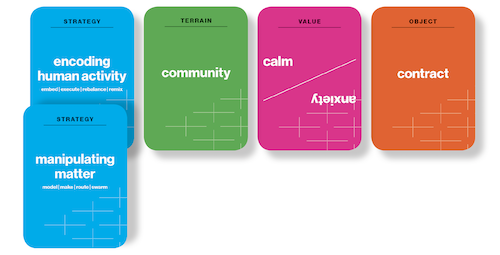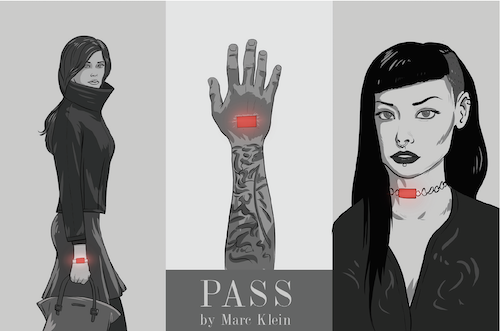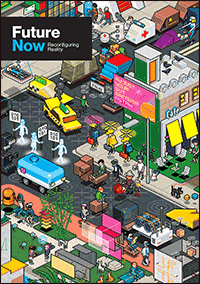Future Now
The IFTF Blog
The Pass / I Shouldn't Have Done It
[This article is one of a four-part series in Scenes From 2027]
The Pass
What happens when infrastructure enforces the law?
As public spaces become increasingly reconfigurable, and infrastructure becomes capable of intelligently tracking, interacting with, and controlling citizens and visitors alike, lines between public safety and overreach blur. Innovative local governments experiment with systems of embedded governance for real-time, services that aim to do everything from manage traffic in public spaces to promote public health to maintain and optimize public good. When local law becomes embedded and automatically enforced, how does it shift the balance between public safety and privacy?

What
The Pass is a Biometric Identification Device. When linked to a home community, the Pass can serve as a “golden ticket” allowing access to services like self-driving taxis and digital libraries of games, music, and books. The Pass can be linked to bank accounts and credit cards making payment as easy as the wave of a hand.
The Pass is worn against the skin. It can perform basic health monitoring and respond to many common conditions. For example, when the Pass notices that the wearer has consumed alcohol (using both biometric and context information), it will automatically restrict access to personal vehicles or the ability to text. In a health emergency, the Pass can also contact first responders without user intervention.
Most users wear their Pass as a wristwatch or as a collar, although some prefer a ring. A new trend is a transdermal implant where the Pass is implanted under the skin with an exposed surface.
So What
The Pass provides a standard format for a variety of smart urban environment systems. Many of the functions of the Pass are available today (in rudimentary form) via mobile phones, which can be problematic for both users and communities. For individuals, identification, health monitoring, and commerce may be limited to certain mobile device models or operating systems, and information may be damaged or lost in an upgrade to a new (and potentially entirely different) phone. Shifting protocols can make it challenging or expensive to keep up with technology upgrades; the widespread use of heavy encryption on mobile phones puts some information about community members out of reach.
This underscores a key tension around such a system: a loss of privacy to civil authorities. While this undoubtedly would be a problem, at the same time, it would create a stricter privacy environment with regards to businesses and advertisers than one typically has with mobile phones. With increased use of artificial intelligence systems, most gathered data would never be seen by other people, unless required by an emergency.

I Shouldn’t Have Done It
Written by IFTF Distinguished Fellow Jamais Cascio for volume three of Future Now,
IFTF's print magazine powered by our Future 50 Partnership.
Smart charter community Cerrito Guapo disciplines a rule-breaker
I shouldn’t have done it. I knew better. And I put my family, my friends, and my community at risk. It was thoughtless and selfish. I’m very, very sorry. Now can I have my life back, Ms. Hurst?
Of course, Sofía, just a few more questions. Oh, and for the record: this is the exit interview for Sofía Maria Reyes, 14 August 2027, Innovation Charter Community, Cerrito Guapo, California.
[Deep sigh] Fine.
I really just want to know: whatever made you think taking your brother’s Pass was a good idea?
He said I could do it! I mean, not in those words, but it was the kind of thing he would let me do. He helped me with my other boyfriend, so I knew he wouldn’t mind me using it with my new one. He’s the one who should have gotten into trouble!
Don’t worry, we’re talking to him, too. But we’re talking about the choices you made that night.
Okay, so me and Grégor wanted to go dancing and he doesn’t turn 18 until September, that’s too long to wait, so I knew that Roberto’s Pass would show him as 20 and you know as well as I do that the face verification doesn’t work well at night with flashing lights so we didn’t have a problem getting into the club. Roberto was home sick so he wasn’t using his Pass, at least I thought he wasn’t, so as long as Grégor didn’t buy anything or get a car or something we’d be fine, right?
Except the Community Healthcare Network knew Roberto was sick. Having his Pass show up at the club was a flag. When the biometrics saw he was dancing we knew it was unhealthy for him and could spread his illness to others. We weren’t looking to arrest anybody, we just didn’t want people to get sick like Roberto. We were worried.
[Deep sigh] Fine. We didn’t stay very long, anyway, G didn’t like the music. I would have had Roberto’s Pass back on his dresser before midnight, but Grégor’s a jerk, and wouldn’t let me take it back. He wanted to go to other places he couldn’t get into yet, he wanted to be “20 for one night.” I didn’t want to let him just run off with the Pass, and I had to be the one to call a car, so I had to stay with him. I told him that I wasn’t going to pay for anything else and he couldn’t buy anything with his own Pass and would definitely get in trouble if he tried to buy something with Roberto’s Pass and he told me to shut up.
That’s when you tapped for emergency?
No, not then, but later. G managed to get some tequila from someone—I’m not going to say who, don’t even ask, but I told him not to do it.
Drinking would have been very bad for Roberto, so when the metadata showed that he had probably consumed alcohol, we had to act.
That’s why the cops showed up so fast after I tapped emergency, I guess.
Now Sofía, you know we don’t have “cops” or “police” here in Cerrito Guapo, we have Emergency Safety Responders. That’s one of the benefits of being a charter community.
[Deep sigh] Fine. That’s why the “eezers” showed up so fast.
[Pause] Right. But the ESRs thought that it was Roberto with you, and that the emergency tap meant he was having a problem with drinking.
When the car suddenly pulled over to the curb and stopped, first we thought the car was broken or hacked or something, but then it wouldn’t allow us to unlock the doors and get out, and we thought we were in so much trouble. I guess we were. Grégor was getting so angry. I was scared.
Unfortunately, the ESRs didn’t recognize that the person with you wasn’t Roberto. The facial verification gave a 60 percent confirmation. You know that the ESRs had brought out the wrong blood type, don’t you? They brought the blood needed for Roberto, not Grégor. That could have killed him.
[Quietly] I know. I really messed up.
When the ESRs found that Grégor wasn’t Roberto, they had to take you both in for full identity verification. Grégor didn’t help himself by trying to fight, but your punishment was reduced because you cooperated. You didn’t mess up as badly as Grégor.
Bad enough. Having to go a month without my Pass was horrible. It was like nobody knew me. Nothing worked. Doors wouldn’t open. I had to have my boss sign me in, I couldn’t call a car or take the bus or even get into a public restroom.
It’s a harsh but effective punishment, isn’t it?
I read about this kind of thing in school, the Amish used “shunning” to punish people. But that was just being shunned by people. It was like the world itself was shunning me. It was awful.
You’re getting your Pass back today, but you should know that there will still be some restrictions for the next 11 months. The city will treat you like a minor again. There will be some things you won’t be able to purchase, some places won’t let you in. If you seem heading somewhere you shouldn’t, you’ll get nudged away—crosswalk signs won’t change for you, navigation apps will show you wrong directions, your Pass will start buzzing. If necessary, we’ll have another talk.
So the Pass is just going to spy on me more? [Quietly] God, I hate this place.
Oh, Sofía. Think of it as having a disappointed nanny. For the length of your probation, the Pass is legally allowed to record anything you do, but you have the right to examine recordings, and they will be permanently deleted if your probation passes without incident.
Now, you have 14 days to appeal this decision to the California Department of Justice. Or, you can save us all some time. Do you agree, Sofîa Maria Reyes?
Do you agree?
 FUTURE NOW—Reconfiguring Reality
FUTURE NOW—Reconfiguring Reality
This third volume of Future Now, IFTF's print magazine powered by our Future 50 Partnership, is a maker's guide to the Internet of Actions. Use this issue with its companion map and card game to anticipate possibilities, create opportunities, ward off challenges, and begin acting to reconfigure reality today.
About IFTF's Future 50 Partnership
Every successful strategy begins with an insight about the future and every organization needs the capacity to anticipate the future. The Future 50 is a side-by-side relationship with Institute for the Future: a partnership focused on strategic foresight on a ten-year time horizon. With 50 years of futures research in society, technology, health, the economy, and the environment, we have the perspectives, signals, and tools to make sense of the emerging future.
For More Information
For more information on IFTF's Future 50 Partnership and Tech Futures Lab, contact:
Sean Ness | sness@iftf.org | 650.233.9517



